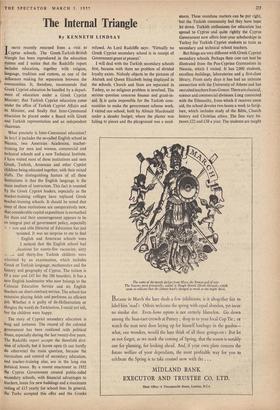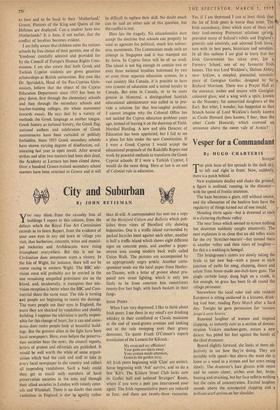The Internal Triangle
By KENNETH LINDSAY What precisely is Inter-Communal education? In brief it includes the so-called English school in Nicosia, two American • Academies, teacher- training for men and women, commercial and technical schools and a new Technical Institute. I have visited most of these institutions and seen Greek, Turkish, Armenian and other Cypriot children being educated together, with their mixed staffs. The distinguishing feature of all these institutions is that the English language, is the main medium of instruction. This fact is resented by the Greek Cypriot leaders, especially as the teacher-training colleges have replaced Greek teacher-training schools. It should be noted that most of these institutions are comparatively new, that considerable capital expenditure is earmarked for them and their, encouragement appears to be an integral part of government policy, especially new and able Director of Education has just ',pointed. It was no surprise to me to find English and American schools were I noticed that the English school had Acations for ninety-five vacancies; sixty and thirty-five Turkish children were admitted by an examination, which includes Greek or Turkish language, mathematics and the history and geography of Cyprus. The tuition is £9 a year and £45 for the 180 boarders. It has a new English headmaster who now belongs to the Colonial Education Service and six English teachers on short-contract service. The school has extensive playing fields and performs an efficient job. Whether it is guilty of de-Hellenisation or (forgive the word) de-Turkisation, I could not tell, but the children were happy.
The story of Cypriot secondary education is long and tortuous. The record of the colonial government has been confused with political issues, especially during the last twenty-five years. The Radcliffe report accepts the threefold divi- Sion of schools, but it leaves open (it can hardly do otherwise) the main question, because the curriculum and control of secondary education, and teacher-training also, are in the long run Political issues. By a recent enactment in 1952 the . Cyprus. Government created public-aided secondary schools, with financial advantages to teachers, loans for new buildings and a maximum ceiling of £15 yearly for school fees. In general, the Turks accepted this offer and the Greeks refused. As Lord Radcliffe says: 'Virtually no Greek Cypriot secondary school is in receipt of Government grant at present.
I will deal with the Turkish secondary schools first, because with them no problem of divided loyalty exists. Nobody objects to the pictures of Ataturk and Queen Elizabeth being displayed in the schools. Church and State are separated in Turkey, so no religious problem is involved. The serious question concerns finance and grant-in- aid. It is quite impossible for the Turkish com- munities to make the government scheme work. I visited one school, built by Alistair Macdonald under a slender budget, where the plaster was falling to pieces and the playground was a sand- storm. These mundane matters can be put right, but the Turkish community feel they have been let down. Turkish enthusiasm for education has spread to Cyprus and quite rightly the Cyprus Government now offers four-year scholarships in Turkey for Turkish Cypriot students to train as secondary and technical school teachers.
But things are very different with Greek Cypriot secondary schools. Perhaps their case can best be illustrated from the Pan-Cyprian Gymnasium in Nicosia, which I visited, It has 2,000 students, excellent buildings, laboratories and a first-class library. From early days it has had an intimate connection with the University of Athens and has recruited teachers from Greece.Thereare classical, science and commercial divisions.Long connected with the Ethnarchy, from which it receives some aid, the school devotes two hours a week to Scrip- ture, which includes study of the Bible,, Church history and Christian ethics. The fees vary be- tween £22 and £38 a year. The students are taught to love and to be loyal to their 'Motherland,' Greece. Pictures of the King and Queen of the Hellenes are displayed. Can a student have two Motherlands? It is here, if not earlier, that the conflict of loyalties becomes evident.
I am fully aware that children enter the various schools by free choice of their parents, one of the `freedoms' carefully selected and provided for by the Council of Europe's Human Rights Com- mission. I am also aware that' both Greek and Turkish Cypriot students are given generous scholarships at British universities. But men like Dr. Spyridakis, Head of the Pan-Cyprian Gym- nasium, believe that the object of the Cyprus Education Department since 1935 has been to play down, first through the elementary schools and then through the secondary schools and teacher-training colleges, the whole movement towards enosis. He says that by a variety of methods the Greek language as mother tongue, Greek history as national history, the Greek flag, national anthem and celebration of Greek anniversaries have been curtailed or publicly forbidden. Since 1935 Greek secondary schools have shown varying degrees of disaffection, cul- minating last year in open revolt. After several strikes and after two masters had been shot dead, the Academy at Larnaca has been closed down. Over a hundred Greece-trained secondary school masters have been returned to Greece and it will be difficult to replace their skill. No doubt much can be said on either side of this question, but the conflict is real.
Here lies the tragedy. No educationalist dare accept the doctrine that schools can properly be used as agencies for political, much less subver- sive, movements, The Communists made such an attempt in Singapore and it was stamped out by force. In Cyprus force will be of no avail. The island is not big enough to contain two or even three national loyalties buttressed, by two or even, three separate education systems. In a vast country like Canada, it is possible to have two systems of education and a united loyalty to Canada. But even in Canada, or to be more precise in Montreal, a distinguished Scottish educational administrator was called in to pro- vide a solution for that less-tangled Problem. I cannot imagine why the Colonial Office has not tackled the Cyprus education problem years ago, instead of leaving it on the doorstep of Field- Marshal Harding. A new and able Director of Education has been appointed, but I fail to see a place for him under the new Constitution. If I were a Greek Cypriot I would accept the educational proposals of the Radcliffe Report and work by peaceful methods to transform the Greek Cypriot schools. If I were a Turkish Cypriot, I would do the same thing. Here at last is an end of Colonial rule in education.



































 Previous page
Previous page